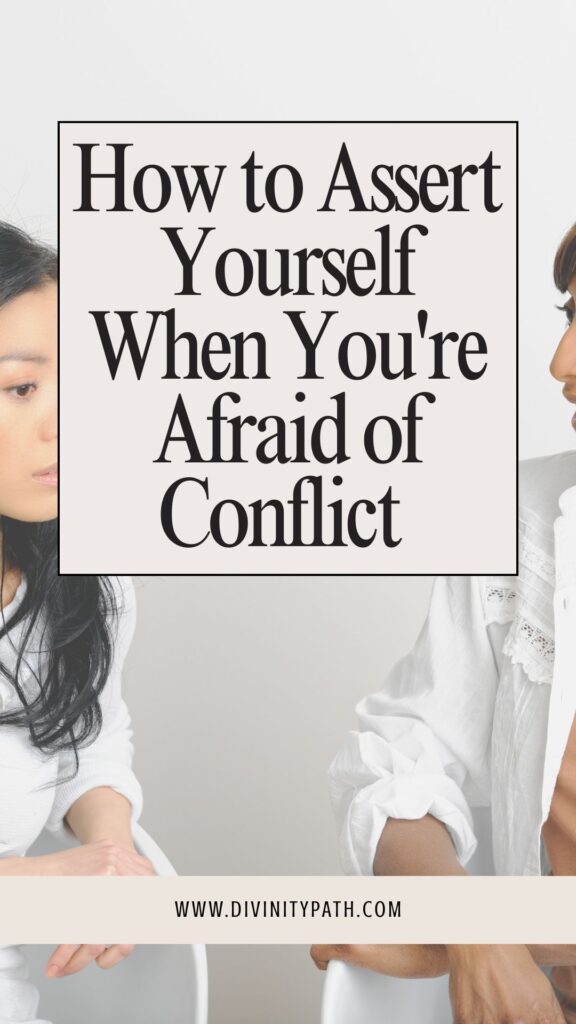How to Assert Yourself When You’re Afraid of Conflict
Some of us can’t even bear the thought of ever saying “no” to someone. Not because we don’t have our own boundaries, but because we’re terrified of being seen as rude, selfish, or—worse—hurting someone we love. In our search for peace, we silence our truth, our needs, and the words we never say. But with every quiet nod, we lose touch with ourselves. And this is where it starts: how do you assert yourself when you’re afraid of conflict but also don’t want to lose your inner peace?
According to the American Psychological Association, more than 60% of people struggle to express their needs in relationships because they fear rejection, judgment, or arguments. Psychotherapists call this conflict phobia—a deep-rooted fear that often stems from childhood, when peace in the home came at the cost of silence. People who are “too nice” today likely grew up in environments where setting boundaries was punished or ignored. But life eventually holds up a mirror, and we no longer want to see someone who constantly adapts, suppresses emotions, and doesn’t know how to stand up for themselves. Gentle assertiveness is a skill. And like any skill, it can be learned.
You know, I didn’t always know how to speak up for myself. Too often I wanted to be kind, to not upset anyone, so I held back my opinions and let others talk over me. Sometimes I felt like a shadow—visible, but unheard. And you probably know, that’s not a pleasant feeling. But I’ve learned that there are ways to stand up for yourself—without becoming aggressive or creating unnecessary conflict. It’s about learning to express yourself with gentleness and respect, but also clearly and firmly. Let me share a few tips with you today.
Why Do We Fear Conflict?
Sometimes the fear of conflict is so intense that we’d rather keep our thoughts to ourselves than risk a disagreement. This fear is deeply wired into us and almost everyone has it. Why? Because from a young age, we’re taught that conflict is unpleasant, stressful, and best avoided or solved as quickly as possible—or even completely ignored. But if we always run from it, we learn that staying silent is easier than voicing our wants and needs.
Research by psychologists like Susan Heitler, who focuses on conflict resolution, shows that people often fear confrontation because the brain triggers a fear of rejection or losing a relationship. This fear acts like an internal alarm system, warning us that we might lose something important—whether it’s a friendship, job, or family connection. So we choose silence to avoid risk. Unfortunately, this often leads to a buildup of frustration and powerlessness, which can eventually damage the very relationships we’re trying to protect.
Why We Fear Conflict: 5 Reasons You Should Know
- Fear of Rejection or Losing Connection
Everyone wants to feel accepted and have good relationships. When we fear conflict, we often fear losing people we love or respect because of what we say. This fear is natural, but it can trap us in a cycle of silence. - Past Negative Experiences
If you’ve had experiences where speaking up led to being punished, criticized, or rejected, it’s normal to avoid similar situations in the future. This “fear of confrontation” becomes a protective mechanism. - Low Self-Esteem and Self-Doubt
People who find it hard to assert themselves often struggle with low self-confidence. They may believe their opinion doesn’t matter or that speaking up will only lead to conflict and misunderstandings. - Lack of Skills for Constructive Expression
Many people simply don’t know how to assert themselves without being aggressive. They fear being seen as rude or difficult, so they stay quiet instead of learning gentle assertiveness. - Culture and Upbringing
In some families or communities, conflict is a taboo subject. Children raised in such environments grow up believing that conflict is bad and must be avoided. This deeply shapes our relationship with conflict in adulthood.

How to Assert Yourself When You’re Afraid of Conflict
Accept That Fear Is Normal
The first step in learning how to assert yourself when you’re afraid of conflict is not to fight your fear. Instead of pushing it down or feeling ashamed of it, try accepting it. Fear is like an inner alarm—it tells you that something isn’t right, that you feel vulnerable, and that something matters to you enough to be scared of losing it. When you acknowledge your fear rather than suppress or shame it, you turn it into an ally.
A simple trick: take a few minutes each day to write down exactly what scares you about speaking up. What do you believe will happen if you say how you really feel? Once it’s written down, fear takes on a name and a face—and that makes it much easier to act. Psychologists call this “fear validation”—or, in simpler words, listen to your fear, but don’t be afraid of it.
You might also love:
- How to Stop Taking Everything Personally in Your Relationship
- Best Books to Transform Your Marriage Into a Lifelong Love Story
- Simple Steps to Stop Being Controlling in Your Relationship
Start With Small Steps
If you’re wondering how to assert yourself when you’re afraid of conflict, it’s helpful to start with simple, low-risk situations that still give you the chance to practice expressing your thoughts. Here are some examples you can try today:
At Work
- “Thanks for sharing your idea. I’d love to add my perspective as well.”
- “I appreciate your opinion, but I’d like to handle this task in my own way.”
- “Could I please get a heads-up a few days in advance so I can prepare better?”
- “Please don’t send me work-related messages after 6 p.m.—I need that time to rest.”
- “I’d prefer a shorter meeting so we can stay focused on the key points.”
With Family or Friends
- “I know you’re trying to help, but I need a little space to sort this out my way.”
- “Can you please respect my time? I’d like to be home by 8 p.m.”
- “I’m grateful for your concern, but I’d rather handle this situation myself.”
- “I’d appreciate it if you didn’t interrupt me while I’m speaking.”
- “Please don’t judge me for the choices I make.”
In a Romantic Relationship
- “Can we talk about this later? I’m not feeling ready right now.”
- “I understand your point of view, but I feel differently.”
- “Let’s not raise our voices when I’m tired, please.”
- “I’d like you to consider my perspective before making a decision.”
- “We need some alone time so we can both recharge.”
Mini Exercise: Write down one sentence you’ll use today—something simple that doesn’t feel too scary to say. “I’d like to share my opinion on this,” is a great place to start. That small win might boost your confidence more than you expect.
Speak About Yourself – Don’t Attack, Just Share Your Feelings
If you’re afraid your opinion might start a conflict, try a different approach. Instead of beginning with “You always…” or “Why don’t you ever…”, try explaining how you feel.
For example:
- “I feel like I’m not being heard when I speak.”
- “It’s important to me that I get to express my thoughts.”
This is one of the most powerful and peaceful ways to assert yourself without stepping on anyone’s toes. People are less likely to react with anger when they feel you’re not attacking them, but simply speaking from your own experience.
Pay Attention to Your Body Language
People don’t just listen to your words—they watch how you say them. If your posture is slouched, you avoid eye contact, and you speak quickly, you’ll even convince yourself that you’re unsure.
So try this: straighten your shoulders, look people in the eyes, and breathe slowly and calmly. Even if you’re shaking inside, your body sends a message to your brain: You’ve got this. This small shift can help you become more assertive without being aggressive. And yes, it’s completely possible—even if conflict makes you nervous!
Accept That Discomfort Is Normal
No one who wants to learn how to assert themselves when they’re afraid of conflict can avoid feeling uncomfortable at times. Discomfort isn’t a sign you’re doing something wrong—it’s a sign you’re stepping out of your comfort zone.
When you learn to stay with that discomfort, your confidence grows—and so do your relationships, becoming more honest and meaningful. A tip for tracking your growth: Every time you feel uncomfortable for setting a boundary or speaking up, pause and write down what you felt. What happened inside you? What did you learn? This becomes your personal courage journal—something to remind you how far you’ve come.
Practice Difficult Conversations
Fear of confrontation often comes from not knowing how you’ll respond when things get real. That’s why practice helps. Yes—you can practice at home! Think of a scenario: how would you tell a coworker something bothered you? Or how would you let a friend know they hurt your feelings?
Keep exploring:
- The Most Overlooked Things to Learn About Your Partner
- The Real Secrets to Being a Confident Woman in a Relationship
- Stop Overthinking After a First Date With These Simple Mind Tricks
You can try speaking in front of a mirror or with a friend who understands you. So prepare a few key phrases ahead of time. It’s not about memorizing a perfect script—it’s about getting comfortable expressing your thoughts before you’re caught in an uncomfortable moment. And if emotions come up? That’s completely okay. Emotions are a natural part of us. Don’t be too hard on yourself.
Listen Actively
One of the best things you can do when you’re afraid of confrontation is to become a good listener. Really! When you truly listen—not just wait for your turn to speak, but genuinely try to understand the other person—your fear of conflict can shrink dramatically. Why? Because you humanize the situation. You start seeing that the other person isn’t your enemy, but a human being with their own fears and needs.
Active listening helps clear up misunderstandings and prevents unnecessary arguments. Next time you’re in a conversation, try to fully hear what the other person is saying before you respond.

Give Yourself the Same Respect You Give Others
How many times have you thought you had to be the one to give in just to keep the peace? That’s not the right approach. If you’re hard on yourself and don’t allow your needs to matter, it will be difficult for others to take you seriously.
One of the best tips for those wondering how to assert yourself without being aggressive is to start with self-respect. Imagine that you’re your own best friend or a beloved family member—how would you encourage them to set healthy boundaries? That same respect toward yourself is the key to expressing your opinions gently but clearly, without needing to argue or fight. Start believing that your needs matter just as much as anyone else’s.
Look for Common Ground or Compromise
We often find ourselves stuck between staying quiet to avoid conflict and not knowing how to speak up without creating one. One of the most effective ways to assert yourself when you’re afraid of conflict is to look for common ground or offer a compromise.
Instead of jumping to defend only your side, try to find areas where you and the other person can agree. This doesn’t mean you’re giving in—it means you’re confident enough to recognize there’s more than one side to every story.
Examples:
- If your partner wants to go out for dinner but you’d rather stay in, try: “I get that you’d love some social time, but I’m feeling a bit tired. What if we go out next weekend and stay in tonight to watch a movie together?”
- When a colleague offers a solution in a meeting that you don’t fully agree with, you could say: “Your suggestion brings up some great points, and I’d love to add a few ideas that might make the solution even stronger for everyone.”
- If a friend cancels plans, you can acknowledge their need while suggesting an alternative: “I completely understand you’re tired today. How about we go for a walk or have coffee at home instead?”
Avoid Using the Word “But”
You’ve probably noticed that when you say “but,” the conversation suddenly takes a defensive turn. That word often feels like a signal that says, “What you said isn’t entirely valid.”
If you want someone to truly hear you, try replacing “but” with words that don’t automatically reject what was just said.
How to do that?
- Instead of: “I understand, but that won’t work.” Try: “I understand, and at the same time, I have a few concerns I’d like to share.”
- Instead of: “I’d love to help, but I don’t have time.” Try: “I’d love to help. Maybe we can find a different time that works better?”









